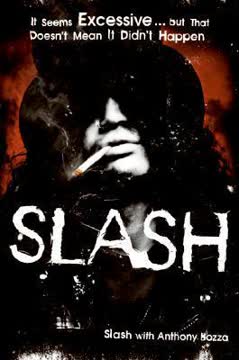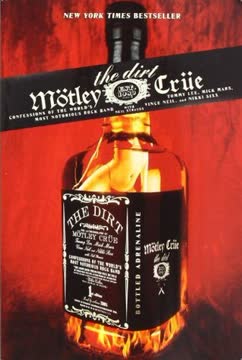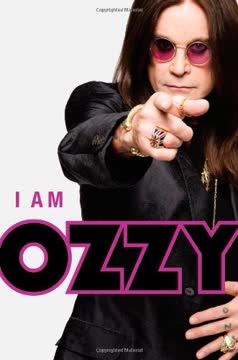Key Takeaways
1. Early Life & Finding Purpose in Music
Being able to create the sound that had spoken to me in music ever since I can remember was more empowering than anything I’d ever known.
Bohemian beginnings. Born in England to creative parents (costume designer mom, artist dad), Slash's early life was unconventional, marked by transatlantic moves and exposure to the vibrant 60s/70s art and music scenes in London and Los Angeles. His parents' separation led to a period of instability and acting out, including BMX obsession, stealing, and early drug use, as he struggled to process emotional turmoil.
Guitar as salvation. A chance encounter with a guitar at age 14 shifted his focus entirely. What started as a way to join a friend's fantasy band quickly became a deep, personal obsession, replacing all other interests. The guitar provided an outlet for expression that drawing or other activities couldn't match, offering clarity and purpose amidst adolescent chaos.
Self-taught drive. Despite initial struggles and impatience with formal lessons, a simple instruction book and relentless practice allowed him to develop his unique style by ear. This intense, self-directed pursuit of mastery, fueled by a deep connection to the instrument and the sounds of classic rock, laid the foundation for his future career.
2. The Raw Power of Early Guns N' Roses
We were passionate, with a common goal and a very distinct sense of integrity.
Forming the core. After various unsuccessful band attempts, a chance reconnection with Izzy Stradlin and the eventual meeting of Duff McKagan, Steven Adler, and W. Axl Rose forged a unique chemistry. This group of like-minded misfits, drawn together by a shared love for raw, blues-based rock and roll and a disdain for the polished LA scene, quickly gelled despite their individual dysfunctions.
Against the grain. Unlike other bands courting record deals with calculated looks and pop choruses, Guns N' Roses embraced their gritty, authentic selves. Their early sound was a raw blend of Aerosmith, New York Dolls, and punk energy, reflecting their chaotic lifestyle and defiant attitude. This genuine, unpolished approach set them apart.
Building momentum. Despite lacking a singer initially and facing constant obstacles (like a broken-down car on their first attempted tour), the band's collective drive pushed them forward. Living together in a squalid rehearsal space, they honed their sound, wrote iconic songs like "Welcome to the Jungle" and "Sweet Child o' Mine," and built a loyal local following through explosive live shows.
3. Addiction: A Seductive and Destructive Force
Being a junkie is akin to what we imagine vampires are: it has an enticing aura at first but it becomes a hunger that must be fed at all costs.
Early experimentation. Drug use began in adolescence, initially recreational and tied to social scenes (BMX, parties). However, the instability of his home life and the intense pressures of the music world created fertile ground for addiction to take root.
Heroin's grip. A first intravenous use of heroin at age 19 proved to be a turning point, quickly escalating into a daily habit. Despite initial attempts to control it or switch to other substances like alcohol, the physical and psychological dependence became a constant struggle, impacting his life and relationships.
The illusion of control. Even as addiction worsened, leading to missed appointments, legal troubles (jaywalking arrest leading to county jail detox), and near-fatal overdoses, Slash maintained a facade of control. He often hid the severity of his use from others, including girlfriends and bandmates, believing he could manage it or quit on his own terms, a common delusion of addiction.
4. Success Breeds Dysfunction
Success fragmented that bond by giving us everything we wanted and a lot we didn’t need—all at once.
The price of fame. Signing with Geffen Records brought financial stability and the resources to pursue their music professionally, but it also introduced new pressures and opportunities for excess. The sudden influx of money, coupled with a lack of structure after the Appetite recording, fueled existing addictive tendencies and individual trips.
Erosion of unity. The collective, us-against-the-world mentality that defined early Guns N' Roses began to erode as individual members pursued separate interests and lifestyles. While some, like Duff, maintained a semblance of responsibility, others, including Slash and Steven, dove deeper into addiction, creating distance within the band.
External influences. The music industry's focus on image and marketability clashed with the band's raw authenticity. Managers and label executives, while enabling their excesses, also attempted to mold them, adding another layer of tension. The band's growing fame attracted hangers-on and opportunists, further complicating relationships and exacerbating internal issues.
5. Life on the Road: Chaos and Camaraderie
Touring, to this day, is still not a cliché to me; every room is not the same.
The ultimate escape. Despite the internal band drama and personal struggles with addiction, touring provided a sense of purpose and excitement that home life often lacked. The constant motion, the energy of live performance, and the camaraderie with bandmates and crew offered a powerful distraction from personal demons.
A learning curve. Early tours were chaotic and unprofessional, marked by unreliable transportation, lack of proper crew, and unpredictable behavior. However, the band learned quickly, adapting to different venues, audiences, and touring conditions, developing a resilience that would serve them later.
Moments of magic. Despite the difficulties, the live shows themselves were often transcendent. The band's raw energy and connection with the audience created unforgettable performances, particularly in international markets where their music resonated deeply. These moments of onstage brilliance were the driving force that kept the band going through turbulent times.
6. The Slow Breakdown of Guns N’ Roses
It had become no fun. It had become depressing.
Axl's evolving demands. As the band's success grew, Axl Rose's behavior became increasingly unpredictable and controlling. His perfectionism, coupled with a growing entourage and a tendency to communicate through intermediaries, created significant friction, particularly regarding punctuality and creative direction.
Loss of key members. The internal tension and chaotic lifestyle led to the departure of founding members. Izzy Stradlin left due to the band's escalating dysfunction and near-disasters, while Steven Adler was fired due to his inability to control his drug use, despite the hypocrisy of the situation given the habits of other members.
Contractual disputes. Legal battles over the band name and songwriting credits further fractured relationships. Axl's insistence on controlling the band's identity and finances alienated other members, transforming a collaborative effort into a perceived dictatorship, ultimately leading to Slash's own departure.
7. Leaving the Past, Finding a New Future
I consider leaving GN’R one of the smartest decisions I’ve ever made.
Hitting the breaking point. After years of navigating increasing dysfunction, lack of communication, and personal struggles, Slash reached a point of emotional and creative exhaustion. The final straw came after a particularly demoralizing rehearsal session and a moment of suicidal ideation, leading to the realization that he had to leave for his own well-being.
A difficult departure. Leaving the band he helped build was emotionally challenging, but the sense of relief outweighed the difficulty. Despite external pressure and disbelief from others, he stood by his decision, prioritizing his mental and physical health over the band's continued existence in its current form.
Rediscovering passion. Free from the constraints and negativity of Guns N' Roses, Slash focused on personal projects like Slash's Snakepit, allowing him to rediscover the joy of playing music without the accompanying drama. This period of creative exploration and collaboration with other musicians was essential for his artistic and personal recovery.
8. Survival and Rebirth Against All Odds
You can’t wait around for destiny to give you what you think you deserve, you have to earn it, even if you think you’ve paid your dues.
Facing mortality. Years of hard living and addiction culminated in a severe heart condition and multiple near-fatal overdoses. These brushes with death served as stark wake-up calls, forcing him to confront the consequences of his lifestyle and seek sobriety.
Finding stability. Marriage to Perla and the birth of his sons provided a new anchor and motivation for lasting change. Perla's unwavering support and the responsibilities of fatherhood offered a stability he had lacked for most of his life, contributing significantly to his sobriety and personal growth.
A new beginning. The unexpected reunion with Duff McKagan and Matt Sorum at a friend's funeral sparked a realization of their undeniable musical chemistry. This led to the formation of Velvet Revolver, a band that allowed him to return to the collaborative, rock-and-roll spirit he cherished, proving that it was possible to find success and fulfillment after leaving Guns N' Roses.
Last updated:
FAQ
1. What’s Slash by Slash about?
- Autobiographical memoir: Slash by Slash is the candid life story of Guns N’ Roses guitarist Slash, chronicling his journey from childhood through the heights and lows of rock stardom.
- Band history and conflicts: The book provides an insider’s view of the formation, rise, and eventual breakdown of Guns N’ Roses, including the complex relationship between Slash and Axl Rose.
- Personal struggles and recovery: Slash details his battles with addiction, health crises, and his eventual path to sobriety, concluding with his experiences in Velvet Revolver and reflections on personal growth.
2. Why should I read Slash by Slash by Slash and Anthony Bozza?
- Unfiltered rock perspective: The memoir offers a raw, honest look at the realities behind the glamor of rock-and-roll, including addiction, fame, and band dysfunction.
- Musical and personal lessons: Readers gain insight into the creative challenges of being in a major band, the importance of camaraderie, and the impact of personal choices on professional life.
- Historical context: The book captures a pivotal era in rock history, making it essential reading for music fans and those interested in the evolution of the industry.
3. Who are the authors of Slash by Slash and what do they bring to the memoir?
- Primary author: Slash, the legendary guitarist, provides firsthand accounts and personal reflections, driving the narrative with his unique voice.
- Co-author expertise: Anthony Bozza, a former Rolling Stone writer, brings journalistic structure and depth, ensuring the memoir is both authentic and accessible.
- Collaborative storytelling: Their partnership blends Slash’s raw experiences with Bozza’s narrative skill, resulting in a compelling and readable memoir.
4. How did Slash’s early life and family background influence his music career according to Slash by Slash?
- Multicultural upbringing: Born to an African American mother and English father, Slash was exposed to diverse cultural and artistic influences from a young age.
- Creative environment: His mother’s work as a costume designer and his father’s career as a painter immersed him in the entertainment industry and artistic circles.
- Resilience from challenges: Family tensions, frequent moves, and his parents’ separation fostered independence and a rebellious spirit that shaped his dedication to music.
5. What role did the guitar play in Slash’s life as described in Slash by Slash?
- Primary form of expression: Guitar became Slash’s “second language,” helping him articulate emotions and find his identity during adolescence.
- Learning process: Inspired by friends and classic rock influences, he taught himself guitar, focusing on feel and passion over technical showmanship.
- Emotional outlet: Playing guitar provided solace and a sense of peace, becoming central to his identity and career.
6. How does Slash by Slash portray the formation and early history of Guns N’ Roses?
- Band origins: Guns N’ Roses formed from the merging of Hollywood Rose and L.A. Guns, with Slash joining after several lineup changes.
- Early struggles: The band faced financial hardships, chaotic tours, and built a loyal fan base through raw, energetic performances in small clubs.
- Breakthrough moment: Their independent EP and signing with Geffen Records marked the start of their rapid rise in the L.A. music scene.
7. What was the creative process and songwriting dynamic within Guns N’ Roses according to Slash by Slash?
- Collaborative approach: Songs often began with a basic idea, then evolved through group input—Axl Rose on lyrics, Izzy Stradlin on structure, and Slash and Duff McKagan on instrumentation.
- Unique chemistry: The interplay between band members, especially between Slash and Izzy, was crucial to their signature sound.
- Evolution over time: Songwriting became more complex and ambitious, especially on the Use Your Illusion albums, reflecting the band’s growth and changing dynamics.
8. How did drug addiction affect Slash and Guns N’ Roses during their rise, as detailed in Slash by Slash?
- Cycle of addiction: Slash describes his struggles with heroin and alcohol, often substituting one for the other and experiencing repeated relapses.
- Impact on band: Addiction led to chaotic living, legal troubles, and strained relationships, but also influenced the band’s creativity and raw sound.
- Attempts at recovery: Multiple rehab stints, health crises, and the loss of friends to overdose highlight the dangers and eventual need for sobriety.
9. What were the main reasons Slash left Guns N’ Roses, according to Slash by Slash?
- Chronic lateness and disrespect: Slash was frustrated by the band’s habit of going on stage late, seeing it as disrespectful to fans and crew.
- Legal and contractual issues: A contract giving Axl Rose ownership of the band’s name and reducing others to hired hands damaged trust and respect.
- Loss of original chemistry: The departure of founding members changed the band’s sound and spirit, prompting Slash to leave.
10. How does Slash by Slash describe the Use Your Illusion tour and its impact on the band?
- High production values: The tour featured elaborate stage setups, backup singers, and horn sections, marking a shift from their earlier raw sound.
- Internal tensions: Axl’s repeated late stage appearances caused resentment and contributed to growing internal conflicts.
- Memorable highs and lows: Iconic performances and chaotic incidents, such as the St. Louis riot, defined the tour’s legacy and foreshadowed the band’s fragmentation.
11. How did Velvet Revolver form and what did it represent for Slash, as recounted in Slash by Slash?
- Reunion of bandmates: Slash, Duff McKagan, and Matt Sorum formed Velvet Revolver, seeking a fresh start after Guns N’ Roses.
- Challenging search for a singer: The band auditioned hundreds before finding Scott Weiland, whose voice and presence completed the lineup.
- Creative rebirth: Velvet Revolver brought renewed camaraderie, musical inspiration, and commercial success, marking a new chapter in Slash’s career.
12. What are the best quotes from Slash by Slash and what do they mean?
- “The sight of a guitar still turns me on.” This reflects Slash’s enduring passion for music and the central role of guitar in his life.
- “There is only one thing you never do—you never leave.” A lesson from Keith Richards, emphasizing perseverance and commitment in a band.
- “A junkie has only two options... They can get clean or they can get dead.” A stark acknowledgment of the life-or-death stakes of addiction, underscoring the memoir’s cautionary themes.
Review Summary
Slash by Slash received mixed reviews. Many fans appreciated the candid insights into Guns N' Roses' history and Slash's personal struggles with addiction. The book offers entertaining anecdotes and details about the band's music-making process. However, some readers found the writing repetitive and poorly structured, with excessive focus on drug use. Critics noted a lack of depth in character development and storytelling. Despite its flaws, the autobiography provides an honest, if sometimes hazy, account of Slash's rock 'n' roll lifestyle and musical journey.
Download PDF
Download EPUB
.epub digital book format is ideal for reading ebooks on phones, tablets, and e-readers.








